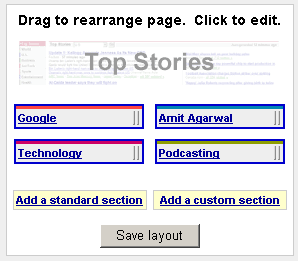Google News allows you to create a Personal Newspaper that tracks only topics that interest you. This "personal edition" can be shared either with friends or you can just bookmark it to read the news on a different computer without loosing any of the News layouts settings or customizations.
The following hack can also help your maintain multiple versions of Personalized Google Pages on a single computer. And all this can be done without even signing up for a Google Account - you can do it anonymously - just follow the three step tutorial below:
Step 1: Open http://news.google.com and click the "Personalize this Page" link. Here you may add new sections, delete existing ones or include new search keyword or a group of keywords using boolean operators. Here's an example of how the section might look after you add your own news topics (or keywords)
If you have already have a Personalized Google News account, skip this step.

Step 2: Scroll to the bottom of the screen and you'll notice a hyperlink saying "Share your personalized news with a friend" - Click that link.

Step 3: The text expands to display a very long and complex URL - Don't get frightened, just right click on the URL and choose "Copy Shortcut" or Bookmark this page. It can be passed via e-mail or IM.

So we are done, just copy-paste that URL in an email message and send it to your friends. They'll see the Google News layout exactly as you see it on your computer. Or you just can post the URL to del.icio.us or Google Bookmarks and read your personal Google News from either work or from home without loosing any of the settings.
Optional Step: Some email programs may truncate very lengthly URLs so it may a good ide to shorten the length using tinyurl.com.
The following hack can also help your maintain multiple versions of Personalized Google Pages on a single computer. And all this can be done without even signing up for a Google Account - you can do it anonymously - just follow the three step tutorial below:
Step 1: Open http://news.google.com and click the "Personalize this Page" link. Here you may add new sections, delete existing ones or include new search keyword or a group of keywords using boolean operators. Here's an example of how the section might look after you add your own news topics (or keywords)
If you have already have a Personalized Google News account, skip this step.

Step 2: Scroll to the bottom of the screen and you'll notice a hyperlink saying "Share your personalized news with a friend" - Click that link.

Step 3: The text expands to display a very long and complex URL - Don't get frightened, just right click on the URL and choose "Copy Shortcut" or Bookmark this page. It can be passed via e-mail or IM.

So we are done, just copy-paste that URL in an email message and send it to your friends. They'll see the Google News layout exactly as you see it on your computer. Or you just can post the URL to del.icio.us or Google Bookmarks and read your personal Google News from either work or from home without loosing any of the settings.
Optional Step: Some email programs may truncate very lengthly URLs so it may a good ide to shorten the length using tinyurl.com.